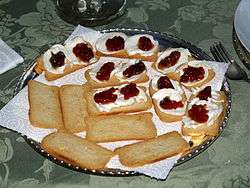Melba toast
|
Melba toast topped with goat's cheese and tomato jam | |
| Type | Toast |
|---|---|
| Creator | Auguste Escoffier |
| Main ingredients | Bread |
|
| |
Melba toast is a dry, crisp and thinly sliced toast, often served with soup and salad or topped with either melted cheese or pâté. It is named after Dame Nellie Melba, the stage name of Australian opera singer Helen Porter Mitchell.[1] Its name is thought to date from 1897, when the singer was very ill and it became a staple of her diet.[2] The toast was created for her by chef and fan Auguste Escoffier, who also created the Peach Melba dessert for her. The hotel proprietor César Ritz supposedly named it in a conversation with Escoffier.[3][4]
Melba toast is made by lightly toasting slices of bread under a grill, on both sides. The resulting toast is then sliced laterally. The thin slices are then returned to the grill with the untoasted sides towards the heat source, resulting in toast half the normal thickness.[5] Thus, it can be described as a twice-baked food (see under rusk).
Melba toast is also available commercially, and was at one time given to infants who were teething as a hard food substance on which to chew.
In France, it is referred to as croûtes en dentelle.[6]
History
In 1925, the Mayo Brothers prescribed the "Eighteen Day Reducing Diet" to Ethel Barrymore. It included Melba toast, which made the toast very popular at the time.
See also
References
- ↑ Fenster, C. (2011). 1,000 Gluten-Free Recipes. 1,000 Recipes. Houghton Mifflin Harcourt. p. 116. ISBN 978-0-544-18909-6.
- ↑ History of Melba Toast
- ↑ Humes, James C. (1978). Speaker's Treasury of Anecdotes About the Famous. Harper and Row. p. 19. ISBN 0-06-012008-8.
- ↑ Kipfer, B.A. (2012). The Culinarian: A Kitchen Desk Reference. Houghton Mifflin Harcourt. p. 363. ISBN 978-0-544-18603-3.
- ↑ Great British Cookbook – Melba Toast
- ↑ Hensperger, B. (2000). The Bread Lover's Bread Machine Cookbook: A Master Baker's 300 Favorite Recipes for Perfect-every-time Bread, from Every Kind of Machine. Harvard Common Press. p. 599. ISBN 978-1-55832-156-4.
